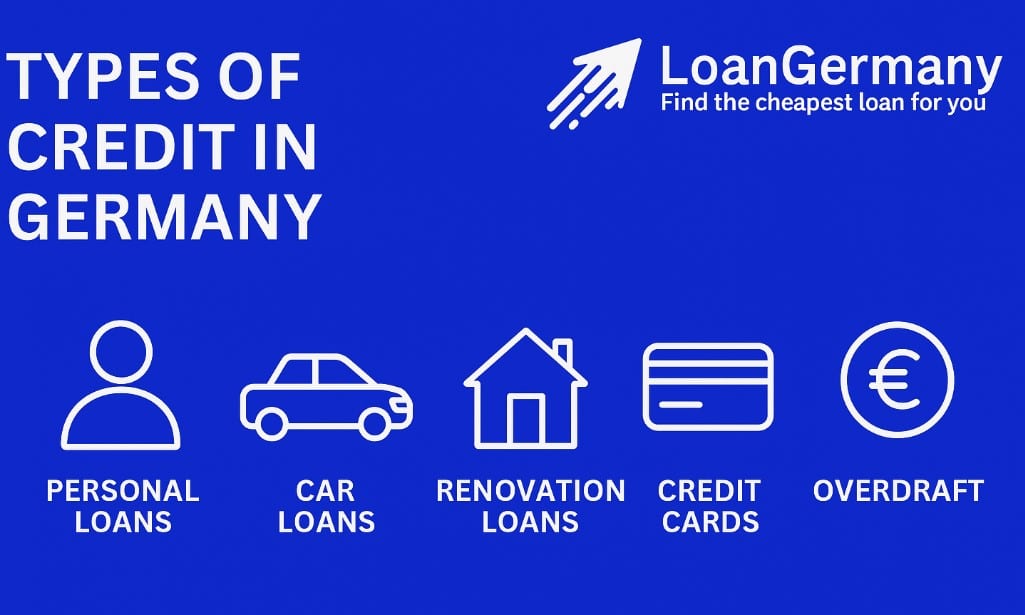Get Credit today
Credit in Germany
Free, 100% digital instant credit comparison
Save money with lower interest rates
Instant answers from up to 19 German lenders
Looking to use credit in Germany? Whether you’re financing a major purchase or consolidating expenses, understanding how credit works is essential. From credit checks to application rules, Germany has a system that rewards preparation—but penalizes missteps. This guide walks you through how to access credit the smart way—without damaging your SCHUFA or overpaying in fees.
Summary: What You Need to Know
- Credit in Germany usually refers to structured installment-based borrowing.
- You can use credit for cars, renovations, consolidation, or personal expenses.
- A good SCHUFA score is often required to access competitive rates.
- Credit is available through banks, online platforms, or brokers.
- Required documents include ID, income proof, and bank statements.
- Non-German citizens can apply if they meet residency and income criteria.
- Comparing offers is key—rates, fees, and terms vary significantly.
- Use our tool at the top of the page to find the best credit offers today.
What Is Credit in Germany?
In Germany, “credit” (Kredit) typically refers to a formal agreement where a lender provides a fixed sum of money, which the borrower repays in monthly installments with interest over a set period. This is not the same as flexible overdrafts or revolving credit lines common in other countries—German credit is usually structured, fixed, and documented.
Credit is widely used for:
- Larger purchases like vehicles, appliances, or renovations
- Debt consolidation (Umschuldung)
- Unexpected expenses that exceed your monthly budget
- Improving liquidity without using savings
Most consumer credit in Germany is unsecured, meaning you don’t need to offer collateral—but your credit history and income stability are crucial for approval.
Credit vs. installment plans
Retailers in Germany often offer “Ratenzahlung” (installment plans), but this is not the same as formal credit. These plans are usually limited to a single product and often come with hidden fees or limited flexibility. A formal credit contract from a bank or lender gives you cash flexibility and usually better transparency.
Types of Credit Available in Germany
Germany offers a range of credit options—each tailored to specific financial needs. Understanding the differences is key to choosing the right product and avoiding unnecessary costs. Below are the most common credit types available to residents in Germany.

Personal loans (Privatkredit)
Personal loans is the most flexible form of credit. You borrow a fixed amount and repay it in equal monthly installments, typically over 12–120 months. Can be used for almost any purpose and often doesn’t require collateral.
Car loans (Autokredit)
Specifically for financing a vehicle purchase. Often offered by banks or directly through dealerships. The vehicle itself may serve as collateral, which can lower your interest rate.
Renovation loans (Modernisierungskredit)
Renovation loans are used for improving or upgrading your property. Typically requires proof of ownership and renovation plans. May qualify for lower interest if energy-saving measures are included.
Credit cards with credit limit
Revolving credit with monthly repayment flexibility. Most German credit cards require full repayment monthly, but some offer partial repayment with interest.
Overdraft (Dispositionskredit)
An agreed overdraft limit on your bank account. Instantly available but comes with very high interest (often 10–14%). Best for short-term gaps only.
How to Get Credit in Germany
Getting credit in Germany requires more than just filling out a form. Lenders follow strict risk assessments—so your income stability, credit history, and documentation all play a major role. The process can be quick if you’re prepared, but small mistakes can lead to rejections or poor offers.
Step-by-step process to apply for credit in Germany
- Compare offers
Use our credit tool above to view tailored loan options based on your profile. - Choose loan amount and term
Decide how much you need and over how many months you want to repay it. Longer terms reduce monthly payments but increase total cost. - Submit application online
Enter personal data, income, employment, and bank info. Some platforms offer pre-checks that don’t affect your SCHUFA score. - Upload required documents
Includes ID, payslips, and recent bank statements. Some lenders also ask for tax returns or proof of residence. - Undergo credit check (SCHUFA)
A formal credit inquiry is triggered. Lenders assess your score and debt ratio to determine approval and interest rate. - Verify identity
Most lenders use VideoIdent or PostIdent to confirm your identity digitally or in-person. - Sign contract and receive payout
Once approved, sign the agreement digitally. Funds are typically transferred within 1–3 business days.
What Documents Do You Need for Credit Approval?
To get approved for credit in Germany, you need to provide clear proof of identity, income, and financial stability. Most lenders won’t process your application without these basics—and any inconsistencies can lead to rejection or delays. Having everything ready in advance significantly speeds up the process.
Document checklist
- Valid passport or national ID
- Residence permit (if applicable)
- Proof of residence (Meldebescheinigung)
- Last 2–3 payslips
- Recent bank statements (Kontoauszüge)
- Employment contract or proof of income
- SCHUFA report (if not pulled automatically)
Valid passport or national ID
All lenders require you to verify your identity. For EU citizens, a national ID card is often enough. Non-EU citizens usually need a passport and a valid residence permit.
Proof of residence (Meldebescheinigung)
This document confirms your official registration in Germany and is often required even if your ID lists a local address. You get it at your local Bürgeramt.
Payslips and bank statements
Lenders want to see that you have a stable monthly income. Most require your last two or three payslips, and often your bank statements to verify income matches what’s declared.
Employment contract or income proof
Especially if you’re new to a job or self-employed, the lender may ask for a signed contract, pension notice, or recent tax return to verify ongoing income.
SCHUFA credit report
Some lenders pull this automatically, but others ask you to provide a recent copy. If you don’t yet have a SCHUFA history, some platforms will offer limited options or higher rates.
What Is SCHUFA and Why Does It Matter?
In Germany, SCHUFA is the most important factor in determining your creditworthiness. Nearly every lender—banks, online platforms, even landlords—checks your SCHUFA score before making a financial decision. If you plan to apply for credit, you need to understand how this system works.
SCHUFA stands for Schutzgemeinschaft für allgemeine Kreditsicherung and is Germany’s largest private credit bureau. It collects data on your past and current financial behavior, including:
- Existing loans and credit lines
- Missed or late payments
- Number of credit applications
- Mobile phone contracts, leasing, and utility accounts
- Public court records or debt collection actions
How the SCHUFA score works
Your SCHUFA score is a percentage between 0% and 100%. A score above 95% is considered excellent, while anything below 90% is considered risky by many lenders. The score reflects your likelihood to repay credit reliably.
How to check your SCHUFA
You can request a free copy of your report once per year from SCHUFA under the “Datenkopie nach Art. 15 DSGVO.” Paid versions with your exact score are available via meineschufa.de.
How to improve your SCHUFA

- Avoid applying for multiple loans at once
- Pay all bills on time
- Keep your bank accounts and credit lines in good standing
- Don’t overuse your overdraft
- Avoid unnecessary credit card applications
Building and maintaining a strong SCHUFA score is essential if you want access to low-interest credit in Germany.
Can Foreigners Get Credit in Germany?
Yes—foreigners can get credit in Germany, but you must meet specific criteria. Banks and online lenders don’t require German citizenship, but they do expect residency, stable income, and proper documentation. The main challenge is often a limited or non-existent SCHUFA history, especially for newcomers.
Requirements for EU and non-EU citizens
As a foreign national, you’ll usually need:
- A registered address in Germany
- A German bank account (DE-IBAN)
- Valid residence permit (non-EU) or EU ID
- Proof of regular income (employment or pension)
- Employment within Germany or a German-based employer
What if you don’t have a SCHUFA yet?
If you’re new to Germany, you likely don’t have a SCHUFA record yet. Some lenders won’t consider your application at all—others will, but offer higher interest rates. Platforms like Auxmoney or finanzcheck.de sometimes work with applicants who have a “thin” credit file.
Tips to build credit as a newcomer
- Open a German current account and avoid overdrafts
- Pay rent and utility bills in your name
- Get a postpaid mobile contract (SCHUFA-relevant)
- Use Buy Now, Pay Later responsibly to build positive history
- Avoid applying for multiple credit products at once
With 6–12 months of clean financial activity, you’ll often build a basic SCHUFA file that qualifies you for entry-level credit offers.
Interest Rates and Costs Explained
In Germany, interest rates on credit are typically shown as the “effektiver Jahreszins”—the effective annual percentage rate. This includes not only the nominal interest, but also fees, commissions, and any mandatory extras. It’s the best number to use when comparing real costs between offers.
Your actual rate depends on several factors:
- Your SCHUFA score and credit profile
- The loan amount and repayment term
- Whether the loan is secured (e.g. car or property) or unsecured
- The lender’s internal risk scoring
Example – Total cost of a €10,000 credit in Germany
| Loan Amount | Term | Interest Rate (eff. APR) | Monthly Payment | Total Repayment | Total Interest |
|---|---|---|---|---|---|
| €10,000 | 3 years | 4.5% | ~€297 | ~€10,692 | ~€692 |
| €10,000 | 5 years | 6.9% | ~€197 | ~€11,820 | ~€1,820 |
| €10,000 | 7 years | 8.5% | ~€157 | ~€13,188 | ~€3,188 |
As shown, extending the term reduces monthly payments but significantly increases the total interest paid.
Additional costs to watch out for
- Loan insurance (Restschuldversicherung): Optional but often added by default—can add €1,000+ in cost
- One-time handling fees: Most lenders no longer charge these, but always check
- Early repayment penalties: Some lenders charge a small fee if you repay early—others don’t
Always calculate the total repayment and not just the monthly rate to understand the full impact of the loan on your finances.
Where to Find the Best Credit Offers in Germany
The credit market in Germany is highly competitive—and that’s good news for borrowers. But offers vary widely depending on your credit profile, loan amount, and repayment term. Comparing multiple lenders is the only way to ensure you’re not overpaying.
To simplify the process, you can use the credit comparison tool at the top of this page. Just enter your desired amount and term, and you’ll receive customized offers from multiple lenders—without affecting your SCHUFA score. It’s free, fast, and non-binding.
Tips when comparing offers
- Focus on the effective APR, not just the advertised rate
- Check if offers include optional insurance by default
- Look for loans with flexible repayment options (e.g. early repayment without penalty)
Comparing 3–5 offers before choosing can save you hundreds or even thousands of euros over the loan term.
What to Consider Before Taking Credit
Before you sign any credit agreement in Germany, take a step back and assess whether the loan truly fits your financial situation and goals. Credit can be useful—but it’s also a long-term commitment. Uninformed borrowing leads to high costs and potential credit damage.
Can you afford the monthly payments?
Use a realistic budget. Don’t just calculate whether you can pay—ask whether you can still handle it if unexpected expenses arise. Ideally, credit payments should never exceed 30–35% of your monthly net income.
Is the loan amount appropriate?
Borrow only what you need. Many people overestimate how much they need and end up paying interest on unused capital. Stick to your renovation quote, car price, or actual liquidity gap.
What’s the total cost—not just the rate?
Always look at the Gesamtkosten (total cost) of the loan, including any insurance, fees, and accumulated interest. A low monthly payment might hide very high long-term costs.
Do you understand the repayment terms?
Check if the loan allows early repayment, extra payments, or payment pauses. Flexibility matters, especially if your financial situation changes.
Are you being pressured into taking optional extras?
Some banks add loan insurance or service packages automatically. These aren’t mandatory and often offer poor value. Only accept what you truly need.
Being selective and well-informed when choosing credit helps you borrow smarter, safer, and cheaper.
Frequently Asked Questions (FAQ) About Credit in Germany
Can I get credit in Germany as a non-citizen?
Yes. You need a registered address, a valid residence permit (if non-EU), and stable income. Some lenders may require a minimum residency period.
Does applying for credit affect my SCHUFA?
Only formal applications do. Using our comparison tool or pre-checks won’t impact your SCHUFA score.
What is a good SCHUFA score for getting credit?
A score above 95% is considered good. Scores under 90% may lead to higher interest rates or rejection.
How long does credit approval take?
If your documents are ready and identity is verified, many online lenders approve within 24–72 hours. Payout can follow shortly after.


